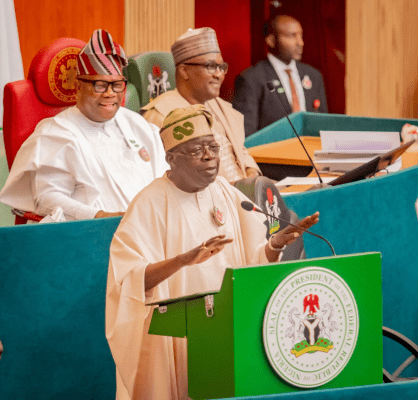Tinubu writes NASS, want an increase of 2025 budget to N54.2 trillion

By Tom Okpe
President Bola Ahmed Tinubu has requested of the National Assembly to Increase the 2025 budget from N49.7 trillion to N54.2 trillion, due to availability of additional revenue to Government.
In a letter read at plenary in both the Senate and the House of Representatives, on Wednesday, the President said the Government was expecting an additional revenue of N4.530 trillion.
The letter also stated that additional revenue will be applied to the solid ninety sector, recapitalisation of the Bank of Agriculture, Bank of Industry, Border Communities Development, construction of military barracks, military aviation and transportation infrastructure.
The letter reads: “I am writing to inform you of the availability of additional revenue of N4,530,479,970,637 and to propose its allocation within the 2025 Appropriation Bill to enhance the budget’s responsiveness to the nation’s most pressing priorities and aspirations.
“This additional revenue, sourced from key agencies, represents a pivotal opportunity to address Nigeria’s critical challenges and advance its developmental agenda.”
According to him, the Government was expecting N1,823,879,970,637 from Government-Owned Enterprises, GOES,
N1,497,600,000,000 from the Federal Inland Revenue Service, FIRS, being the Federal Government’s 52% share of the increase in revenue from N22.1 trillion to N25.1 trillion and N1,209,000,000,000 from the Nigerian Customs Service, NCS, Federal Government’s 52% share of the increase in revenue from N6.5 trillion to N9.0 trillion.
He further stated that with this additional revenue, the 2025 Appropriation Bill’s total budget size will increase from N49.7 trillion to N54.2 trillion, demonstrating our commitment to inclusive growth and security.
President Tinubu also noted that, “these funds be allocated to the following transformative expenditure areas: Solid Minerals Sector-N1 trillion. To support economic diversification by unlocking the potential of Nigeria’s vast solid mineral resources, which remain an untapped revenue stream and a vital pillar of non-oil growth.
“Recapitalization of the Bank of Agriculture, BoA, N1.5 trillion: To transform Nigeria’s agricultural landscape, ensure food security, and empower smallholder farmers and agribusinesses.
“Recapitalization of the Bank of Industry, Bol, N500 billion to provide critical support to small and medium enterprises, SMEs, drive local manufacturing, and reduce dependence on imports.”
In addition, he said in the area of critical Infrastructure Projects, RHID Fund, the Government intends to spend N380 billion on Irrigation Development, through River Basin Development Authorities, while transportation Infrastructure, roads and rail, will take N700 billion, 300 billion for the construction and rehabilitation of critical roads and 400 billion for light rail network development in urban centers.
Others include Border Communities Infrastructure: N50 billion, Military Barracks Accommodation: N250 billion, and Military Aviation: N120 billion.
Justifying the expenditure, the President the N1 trillion proposes as additional funds for the solid minerals sector will reduces reliance on volatile oil sector by creating alternative revenue streams, encourages development in resource-rich, underserved areas, boosting rural economies and supports processing and export of minerals, increasing foreign exchange earnings.
The Bank of Agriculture is to be recapitalisee to empowers smallholder farmers and agribusinesses, improving access to affordable credit, enhances agricultural productivity and supports agro-industrial value chains and promotes the export of high-value crops, reducing pressure on the Naira.
Similarly, the Bank of Industry is to be recapitalised to provides affordable financing for innovation and entrepreneurship, drives industrial growth and supports local manufacturing, reducing unemployment and expands the tax base through industrial expansion.
The President said further that N380 billion has been earmarked to strengthen Nigeria’s capacity for year-round agricultural production, ensuring water security and boosting food supply, while N700 billion will modernize Nigeria’s road and rail networks, reducing costs, enhancing connectivity, and supporting economic activity.
The government he swid is further into providing N50 billion for the development of border Communities Infrastruct to improve living standards and enhance the security of border regions, fostering stability and cross-border trade.
In the area of security, he said N250 billion will provide modern and expanded housing for personnel, boosting morale and operational readiness, while an additional N120 billion will modernize Nigeria’s aviation capabilities, ensuring the military remains responsive to emerging security challenges.
President Tinubu emphasiser that “the foundation of a thriving nation lies in its ability to protect its citizens. No infrastructure, no innovation, and no progress can be enjoyed or sustained without security.
READ ALSO: Nigerian leader establishes federal university Ogoni
“The government has a constitutional obligation to secure lives and property, and military expenditure is not merely a fiscal decision-it is a moral imperative.
“By investing in our armed forces, we affirm our resolve to end terrorism, safeguard the dignity of our people, and create conditions for economic prosperity. This budget reflects not only our commitment to securing Nigeria today but to building a future where every citizen can live and thrive without fear.
“This allocation framework underscores the Administration’s dedication to fostering inclusive growth, addressing security challenges, and building resilience into Nigeria’s economic fabric.
“These investments will promote stability by addressing critical infrastructure deficits, especially in underserved regions, and strengthening national security; diversify revenue by investing in agriculture, solid minerals, and manufacturing. reducing over-reliance on oil revenues and catalyze economic growth by enhancing infrastructure, supporting SMEs, and unlocking Nigeria’s vast economic potential.
“I urge the National Assembly to adopt and integrate these proposals into the 2025 Appropriation Bill, reflecting our shared commitment to national development. Kindly let me know if additional information or clarification is required.”







